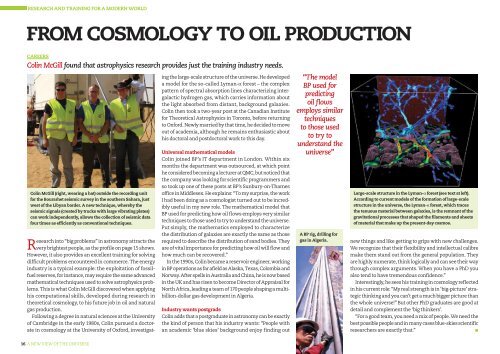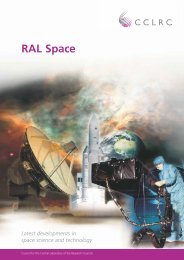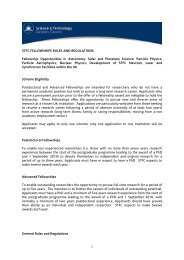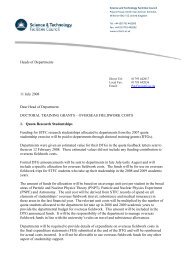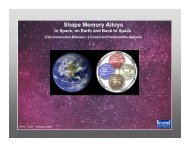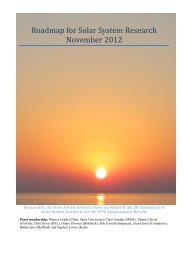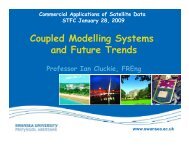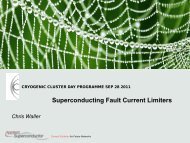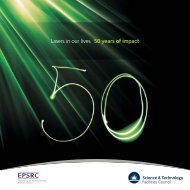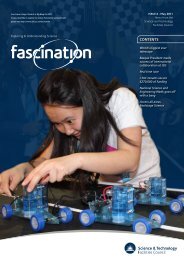A new view of the Universe - Science & Technology Facilities Council
A new view of the Universe - Science & Technology Facilities Council
A new view of the Universe - Science & Technology Facilities Council
Create successful ePaper yourself
Turn your PDF publications into a flip-book with our unique Google optimized e-Paper software.
RESEARCH AND TRAINING FOR A MODERN WORLD<br />
FROM COSMOLOGY TO OIL PRODUCTION<br />
CAREERS<br />
Colin McGill found that astrophysics research provides just <strong>the</strong> training industry needs.<br />
Colin McGill (right, wearing a hat) outside <strong>the</strong> recording unit<br />
for <strong>the</strong> Bourarhet seismic survey in <strong>the</strong> sou<strong>the</strong>rn Sahara, just<br />
west <strong>of</strong> <strong>the</strong> Libyan border. A <strong>new</strong> technique, whereby <strong>the</strong><br />
seismic signals (created by trucks with large vibrating plates)<br />
can work independently, allows <strong>the</strong> collection <strong>of</strong> seismic data<br />
four times as efficiently as conventional techniques.<br />
Research into “big problems” in astronomy attracts <strong>the</strong><br />
very brightest people, as <strong>the</strong> pr<strong>of</strong>ile on page 15 shows.<br />
However, it also provides an excellent training for solving<br />
difficult problems encountered in commerce. The energy<br />
industry is a typical example: <strong>the</strong> exploitation <strong>of</strong> fossilfuel<br />
reserves, for instance, may require <strong>the</strong> same advanced<br />
ma<strong>the</strong>matical techniques used to solve astrophysics problems.<br />
This is what Colin McGill discovered when applying<br />
his computational skills, developed during research in<br />
<strong>the</strong>oretical cosmology, to his future job in oil and natural<br />
gas production.<br />
Following a degree in natural sciences at <strong>the</strong> University<br />
<strong>of</strong> Cambridge in <strong>the</strong> early 1980s, Colin pursued a doctorate<br />
in cosmology at <strong>the</strong> University <strong>of</strong> Oxford, investigating<br />
<strong>the</strong> large-scale structure <strong>of</strong> <strong>the</strong> universe. He developed<br />
a model for <strong>the</strong> so-called Lyman- forest – <strong>the</strong> complex<br />
pattern <strong>of</strong> spectral absorption lines characterizing intergalactic<br />
hydrogen gas, which carries information about<br />
<strong>the</strong> light absorbed from distant, background galaxies.<br />
Colin <strong>the</strong>n took a two-year post at <strong>the</strong> Canadian Institute<br />
for Theoretical Astrophysics in Toronto, before returning<br />
to Oxford. Newly married by that time, he decided to move<br />
out <strong>of</strong> academia, although he remains enthusiastic about<br />
his doctoral and postdoctoral work to this day.<br />
Universal ma<strong>the</strong>matical models<br />
Colin joined BP’s IT department in London. Within six<br />
months <strong>the</strong> department was outsourced, at which point<br />
he considered becoming a lecturer at QMC, but noticed that<br />
<strong>the</strong> company was looking for scientific programmers and<br />
so took up one <strong>of</strong> <strong>the</strong>se posts at BP’s Sunbury-on-Thames<br />
<strong>of</strong>fice in Middlesex. He explains: “To my surprise, <strong>the</strong> work<br />
I had been doing as a cosmologist turned out to be incredibly<br />
useful in my <strong>new</strong> role. The ma<strong>the</strong>matical model that<br />
BP used for predicting how oil flows employs very similar<br />
techniques to those used to try to understand <strong>the</strong> universe.<br />
Put simply, <strong>the</strong> ma<strong>the</strong>matics employed to characterize<br />
<strong>the</strong> distribution <strong>of</strong> galaxies are exactly <strong>the</strong> same as those<br />
required to describe <strong>the</strong> distribution <strong>of</strong> sand bodies. They<br />
are <strong>of</strong> vital importance for predicting how oil will flow and<br />
how much can be recovered.”<br />
In <strong>the</strong> 1990s, Colin became a reservoir engineer, working<br />
in BP operations as far afield as Alaska, Texas, Colombia and<br />
Norway. After spells in Australia and China, he is now based<br />
in <strong>the</strong> UK and has risen to become Director <strong>of</strong> Appraisal for<br />
North Africa, leading a team <strong>of</strong> 170 people shaping a multibillion-dollar<br />
gas development in Algeria.<br />
Industry wants postgrads<br />
Colin adds that a postgraduate in astronomy can be exactly<br />
<strong>the</strong> kind <strong>of</strong> person that his industry wants: “People with<br />
an academic ‘blue skies’ background enjoy finding out<br />
“The model<br />
BP used for<br />
predicting<br />
oil flows<br />
employs similar<br />
techniques<br />
to those used<br />
to try to<br />
understand <strong>the</strong><br />
universe”<br />
A BP rig, drilling for<br />
gas in Algeria.<br />
Large-scale structure in <strong>the</strong> Lyman- forest (see text at left).<br />
According to current models <strong>of</strong> <strong>the</strong> formation <strong>of</strong> large-scale<br />
structure in <strong>the</strong> universe, <strong>the</strong> Lyman- forest, which traces<br />
<strong>the</strong> tenuous material between galaxies, is <strong>the</strong> remnant <strong>of</strong> <strong>the</strong><br />
gravitational processes that shaped <strong>the</strong> filaments and sheets<br />
<strong>of</strong> material that make up <strong>the</strong> present-day cosmos.<br />
<strong>new</strong> things and like getting to grips with <strong>new</strong> challenges.<br />
We recognize that <strong>the</strong>ir flexibility and intellectual calibre<br />
make <strong>the</strong>m stand out from <strong>the</strong> general population. They<br />
are highly numerate, think logically and can see <strong>the</strong>ir way<br />
through complex arguments. When you have a PhD you<br />
also tend to have tremendous confidence.”<br />
Interestingly, he sees his training in cosmology reflected<br />
in his current role: “My real strength is in ‘big-picture’ strategic<br />
thinking and you can’t get a much bigger picture than<br />
<strong>the</strong> whole universe!” But o<strong>the</strong>r PhD graduates are good at<br />
detail and complement <strong>the</strong> ‘big thinkers’.<br />
“For a good team, you need a mix <strong>of</strong> people. We need <strong>the</strong><br />
best possible people and in many cases blue-skies scientific<br />
researchers are exactly that.”<br />
■<br />
16 A NEW VIEW OF THE UNIVERSE


